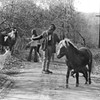Published December 11, 2002 at 10:26 p.m.
As an anthem for a bygone era, a popular tune by rocker Tom Petty seems to sum up what's happening nationwide in commercial radio these days: "There goes the last DJ/who plays what he wants to play/and says what he wants to say/Hey, hey, hey..."
Hey, it's a heartbreaker. Some Vermont radio enthusiasts are concerned that DJs at The Point, among the medium's few remaining bastions of independence, have recently lost the freedom to play what they want to play. These disaffected listeners also lament a repertoire that has become more limited and repetitious at the 25-year-old Montpelier FM station, which once went just by its call letters, WNCS. And there's been a significant turnover -- some say a mass exodus -- of employees in the last year. Many cherished on-air personalities are gone.
Has this entertainment touchstone, which reflected the state's nonconformist nature, suddenly become a victim of corporate creep? Since the summer, a computer has been dictating most of the station's musical selections -- disc jockeys can only choose two songs out of 10 or 11 offered within any given hour. As radio itself clings to life in the face of new cyber technologies and television's ever-expanding pull, The Point may be trying to survive by joining the zeitgeist.
"It's beginning to sound like every other homogenized radio station in the country," complains Fred Wilber, owner of the capital city's Buch Spieler music store.
"WNCS is more monochromatic now," suggests Wayne Howe, an elementary school principal who lives in Jericho.
"The station was once experimental, creative and diverse," says Sam Falzone, a Burlington resident who works in the housing finance field. "You never knew what you were going to hear. Now, it's almost predictable."
What Falzone considers predictable, The Point sees as professional. "We have less choice because we want the station to have more consistency," explains Program Director Mark Miller, 29. "The same music is just more evenly distributed."
As the person who selects songs for the computer from a dwindling library, he dismisses complaints about lack of choice. "I've worked at 10 commercial stations around the country and this is the first one I've encountered that lets DJs pick any music at all," says Miller. "We've hired people from other places, even WIZN [an FM classic-rock station in Burlington], and they're stunned to discover our DJs are allowed to pick two songs -- or even one. We give DJs more leeway than any station in the entire United States."
Miller's claim could not be easily verified, but no one disputes that FM -- once the underground rebel of radio -- is not what it used to be: a DJ-driven, free-form exploration of the myriad ways music influences emotion and imagination. "WNCS really helped define the counterculture in Vermont," theorizes Howe, 49.
True "progressive" FM radio was often also forward-looking in its embrace of debuts by talented performers. Although old and new music can still be heard on The Point, critics claim the pioneering spirit has been reined in.
The two radio sensibilities -- progressive and today's more constrained FM -- can be compatible, according to company vice-president Ed Flanagan, who has been with the station since 1978. "Our listeners now know what they're going to get," he acknowledges. "But we're still risk-taking. Our core values are the same as when we started."
The original WNCS visiontapped into hippie idealism when it was launched in June 1977 by several University of Vermont alums who had worked at the school's non-commercial FM station, WRUV. The group included owners Jeb Spaulding -- today the state's treasurer-elect -- and his wife Susan.
"We wanted to be very eclectic," recalls Spaulding, a 1975 UVM graduate who worked at a hip radio station in Maine before founding WNCS. "We were trying to be a full-service station that targeted the 18-to-34-year-old audience. We even had talk shows at first. We did everything from Broadway show tunes to avant-garde jazz, all in the same set. There was quite a bit of originality."
The idea was to tailor progressive FM to a central Vermont lifestyle, Spaulding says. "We even played bluegrass and country. Over the years, though, we had to narrow our scope. The talk shows were dropped. We weren't playing many Broadway musicals any more. We still had jazz but no Thelonious Monk."
The trend in radio now is to "develop a niche and make sure people know what they're going to hear," he surmises. "That's something we always resisted."
After his election to the state Senate, Spaulding felt he could no longer give WNCS the attention it deserved. In 1987 he sold the station to Steve Silberberg, a lawyer who had formed the Northeast Broadcasting Company six years earlier in Haverhill, Massachusetts. The profitable Vermont venture increased from 3000 to 50,000 watts, which meant WNCS could reach more effectively into populous Chittenden County.
In the early 1990s, Silberberg acquired other frequencies to simulcast The Point to an even wider geographic area of the state. The significant changes in format, however, have taken place primarily in the last year.
"There goes your freedom of choice," sings Tom Petty, who got his start in the music business at about the same time as WNCS. "There goes the last human voice..."
Jody Petersen's warm voice could be heard on The Point for the better part of 21 years. She quit her job as DJ and program director last spring, just as the station's metamorphosis was beginning. "I had an epiphany," she says. "I could see where this was going and I didn't want to stick around."
Osama bin Laden shares some of the blame. "After 9/11, the economic problems in the country totally trickled down, so that the cash flow at the station was compromised," remembers Petersen, now 47. "Management needed to make cuts. I do have compassion for their situation. The problem is that nobody really told me what was coming. The image changed so suddenly and drastically."
Petersen witnessed the first signs of upheaval with the January 2002 arrival of a California-based consultant brought in to tinker with the station's format. "After that," she notes, "there was a chain reaction. This is an industry that's just cannibalizing itself."
Jon Noyes describes himselfas "the first casualty of war." The Barre native was dismissed in March 2001 after almost three years as a DJ during The Point's morning-drive-time shift from 5 to 10 a.m. Budget-trimming was the ostensible reason given for his departure, but Noyes believes his resistance to the impending changes spelled doom.
The station was being "fine-tuned to become less esoteric," says Noyes, 44. "One of the first shots fired over the bow was when we were told, 'Don't encourage requests from listeners; don't play requests that are not on the computer.' If Joe Shmo asks for Bob Dylan's 'Blood on the Tracks,' too bad."
As someone who grew up in the business -- his father, Alan, was once general manager at local AM stations -- the younger Noyes is saddened by The Point's transformation. "I miss having that great audience of intelligent listeners to talk to every morning," he says. "Radio is the most intimate medium. People really make a connection. When you start tweaking and think listeners won't notice, that is disrespecting the audience."
One of those listeners, Sam Falzone, has been tuning in since 1979. "It was so refreshingly eclectic, the DJs were knowledgeable and you could hear music not played elsewhere," he says. "Mediocrity is taking over. We've lost something precious."
Spaulding reports that some of his constituents have recently begun recommending he buy back the station, but that's an unlikely scenario.
After Noyes was canned, The Point -- sounding more and more "canned" -- lost several other disenchanted DJs: Ted Pogacar, 45, had been with the station for 18 years; Walt Amses, 56, could trace his association with WNCS back to 1986; Eric Thomas, 29, had put in seven years.
"It's all about greed," says Pogacar, a Thetford high school English teacher who handled the Saturday night 6 to 11 p.m. slot at The Point. "The station wants to compete in the Arbitron ratings system to lure advertisers."
To do so, the previous Triple A format -- short for Adult Album Alternative -- became more of "a Triple A Classic Hybrid," Petersen says. Aiming to lure more mainstream listeners who presumably prefer the familiar, the station now features fewer new CDs and retreads classic rock hits, rather than less obvious album cuts.
"When I quit in August," Pogacar explains, "suddenly we were playing 'Satisfaction,' by The Rolling Stones, which we never did before. Or 'Rhiannon,' by Stevie Nicks. We hadn't touched that stuff for 25 years. They're now playing nothing that isn't being played everywhere else. Yes, there's still old and new music on the station, but what's missing is the depth."
Walt Amses, who resigned in September, muses about "the narrowness of it all" and the fact that pre-determined songs destroy "radio that is there in the moment."
Although Miller stresses that DJs "are still free to be themselves on the air," Pogacar's view is decidedly skeptical: "Who needs the DJs? They're not saying anything anymore. There's no spontaneity left."
The Point now identifies itself after each song, preventing DJs from creating a seamless segue from one tune to the next -- an arc of continuity that establishes a mood. "It's a format for people with an attention span of one-half-millionth of a second," Petersen contends. "Our loyal, active listeners must wonder about the little promos for being 'Vermont's music adventure!' and the ID-ing between every song."
Ed Flanagan defends the station's self-recognition. "We needed to remind people they are hearing, say, Van Morrison on The Point and not on WIZN or Champ, which also play classic rock."
Program Director Mark Miller adds: "On TV, CNN keeps showing their logo so viewers realize they're not watching the other cable news channels."
A former WNCS employee who wants to remain anonymous points out that "the more you sound like everybody else, the more you have to ID yourself."
The conventional wisdom is that persistent promotional plugs will nudge the Arbitron sweepstakes that manipulate the competitive radio market. "Stations are rated by memory recall," says Miller. "And we do want to raise our ratings."
In the process of a ratings-fueled modernization, the options for DJs became almost non-existent. "We once had a 15,000-song database, about 9000 of them active," Pogacar says. "Then, a few years ago, there were just 4000 or so that remained active. Since the end of July, only 1200 to 1500 are still active. That coincided with the station's 25th-anniversary celebrations. Hooray, hooray, and good-bye, progressive radio."
For Walt Amses -- a North Calais special-education teacher whose WNCS show ran on Saturdays from 10 a.m. to 2 p.m. for the last 13 years -- the DJ job becomes meaningless once choice is limited. "Why would I want to continue?" he asks rhetorically. "It's boring. You could train an animal to do that. And I would have worked there for nothing. Money was never the issue."
With the specter of monkeys replacing people at the station, Amses bemoans the new reality: "The consultant from Santa Monica was pushing a one-size-fits-all radio and badly misread this market. After just one month of listening to this central Vermont icon, he decided that DJs should no longer control the music on their programs. The owner of the station, Steve Silberberg, doesn't live here. To him, the product is immaterial. Unfortunately, this product was so special to us."
Silberberg did not return several calls requesting an interview. The controversial entrepreneur now owns 10 Vermont stations, including a brand-new Middlebury FM operation called Alice. The parent company, Northeast Broadcasting, is engaged in what one observer deems "empire-building" throughout the region.
Ironically, the firm's flagship station in Haverhill -- WXRV, a.k.a. The River -- recently received rave reviews from The Boston Globe, which also lauded "the 1960s-inspired philosophies" of Silberberg: "The River is reaching audiences the old-fashioned way," the November 29 article reads, "with a laid-back staff who are passionate about music, value independent thinking over research results and spin songs not because they're hits, but because they're good."
Eric Thomas, The Point's assistant program director and mid-day DJ who departed in August, sees Silberberg's empire in a far less flattering light. "The pay was so bad that working at WNCS had to be a labor of love," he says. "When you take away the love, it's just a labor." Nonetheless, his resignation was "the most gut-wrenching decision I ever made. I love that place like a friend."
Thomas continues to look for a silver lining. "The Point's rotation of songs is not as frequent as at other Triple A stations. And a lot of stations won't play that Tom Petty song, 'The Last DJ.' It's been banned elsewhere."
The "anonymous" former employee also feels torn. "The station used to have a quirky, self-effacing character. They're very serious and pompous now. WNCS sounds more packaged, like it had a lobotomy."
Petersen sees The Point as "a beautiful old farmhouse, where people lived communally, filling it with the flavors and spices of life. Eventually, the place needs work. When you hear other radio stations, you realize that WNCS may have become McMansion, but it's still a gem. There's still lots of integrity there."
Ex-DJ Ted Pogacar has a somewhat more sardonic perspective. "The Point now operates on a we-suck-less premise. But it's not OK to sell out, even a little, just because everyone else is doing that in a major way."
Yet Petersen dreams of a phoenix rising out of the ashes, possibly recapturing the glory days at WNCS. "It could happen," she speculates. "I have hope they'll raise the freak flag again.
More By This Author
Speaking of...
-

Soundbites: Half a Century on the Air, WGDR Looks to Its Future
Nov 22, 2023 -

Two Local Band Directors March in the Macy's Parade
Nov 22, 2023 -

Before a Burlington Show, the Wood Brothers Get Back to Basics
Oct 26, 2023 -

After a Half-Century of Leading Local Ensembles, Steven and Kathy Light Prepare a Musical Farewell
May 3, 2023 -

Double E 2023 Summer Concert Series Kicks Off With the Wailers
Mar 17, 2023 - More »
Comments
Comments are closed.
From 2014-2020, Seven Days allowed readers to comment on all stories posted on our website. While we've appreciated the suggestions and insights, right now Seven Days is prioritizing our core mission — producing high-quality, responsible local journalism — over moderating online debates between readers.
To criticize, correct or praise our reporting, please send us a letter to the editor or send us a tip. We’ll check it out and report the results.
Online comments may return when we have better tech tools for managing them. Thanks for reading.












































